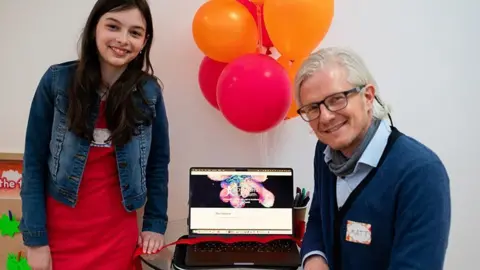New centre launched for children's gut health
 Kelly Spike
Kelly SpikeA new centre focused on improving the lives of children with inflammatory bowel diseases has opened in Cambridge.
The Cambridge Centre for Children's Gut Health will see cutting-edge research from scientists at the University of Cambridge, including the study of "mini-guts".
The mini organs are created from the cells donated by children, which allow scientists to study the bowel diseases and identify potential new treatments.
Matt Zilbauer, director of the centre, said children and young people were "enthusiastic" about helping to better understand their conditions.
 Kelly Spike
Kelly SpikeProfessor Zilbauer, who is also a consultant at Addenbrooke's Hospital, hoped the new centre would help identify ways of personalising treatments.
He also wanted it to give children access to the latest drugs, clinical trials and outstanding clinical care.
Their study of mini-guts with a team at the Cambridge Stem Cell Institute, showed DNA changes may play an important role in Crohn's disease.
After publishing their study, the team recruited a further 500 patients and generated nearly 1,000 organoids.
"To study these diseases, we need our children and young people to donate a few extra tissue cells when we're investigating their condition," he said.
"We couldn't do our research without their help.
"The children are amazing – they're all really keen to help us and to contribute to finding new treatments, even when they know these treatments may not benefit them directly."
The centre will also have a psychiatric team.
Claire Glemas, research nurse and patient engagement lead at Cambridge University Hospitals, said: "Inflammatory bowel diseases are lifelong conditions with no cure.
"It's really tough for the children and young people we see, so it's important that we look after every aspect of their health. By looking after their mental health alongside their physical health, we hope to make their lives easier."
Follow Cambridgeshire news on BBC Sounds, Facebook, Instagram and X.
